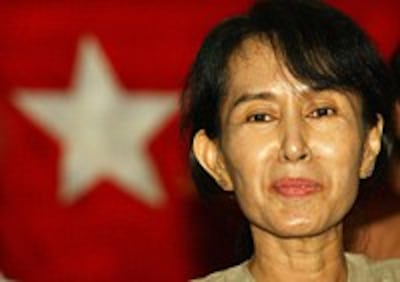
BANKGOK—Some 2,000 Buddhist monks marched on Saturday to the home of detained opposition leader Aung San Suu Kyi, who greeted them silently and tearfully, according to witnesses.
“We are satisfied and pleased that we were able to give her our prayer while she is under restriction and wasn't able to get any chance to receive it [earlier],” one monk said in an interview.
“She is the symbol of our country and peace, and [she is] recognized as the leader of the people. It was very satisfactory to see this scene. We had no chance to speak with her as she is under very tight restrictions. We worked very hard to reach this point.”
Aung San Suu Kyi, a Nobel Peace laureate and leader of the opposition National League for Democracy (NLD), emerged from the house in which she has been held since 2003.
Witnesses estimated the number of monks marching to Aung San Suu Kyi's home at about 2,000, but protests also continued in Mandalay, Burma’s second major city, and a half-dozen townships across the country.
When we chanted prayers, she stepped out of her house, coming near the fence, listening to our prayers and receiving our passion.
Witnesses in Mandalay said up to 10,000 monks marched through Mandalay, with no clashes reported.
Aung San Suu Kyi ‘s party, the NLD, won 1990 general elections by a wide margin, but the ruling junta has ignored those results. The daughter of Burma’s independence hero, Gen. Aung San, she has spent 11 of the last 18 years under house arrest.
“Today we gathered 2000 monks on the Shwedagon Pagoda, and then we came down from the western entrance onto Pyi road,” another monk said. Shwedagon Pagoda is the holiest site in Burma.
Monks in Thandwe blocked
“We stopped in front of Burma broadcasting station and prayed there. Then we marched toward University Avenue from Hledan junction—we stopped outside Daw Aung San Suu Kyi's compound… When we chanted prayers, she stepped out of her house, coming near the fence, listening to our prayers and receiving our passion.”
Meanwhile, in Thandwe town in southwestern Arakan state, authorities stopped some 50 protesting monks and blocked their way with long bamboo poles when they began marching from their monastery in Thandwe.
When they were asked to stop their demonstration, the monks returned to their monastery.
Meanwhile, in Sittwe, also in Arakan state, abbots from local monasteries formed a managerial group to protect those monks who join the protests, the head monk from a Sittwe monastery said.
And in the former capital, Rangoon, 750 monks from Ywama monastery in Insein township, were forced to leave the monastery and return home afer Ywama leaders came under pressure from the authorities, sources said.
Largest outcry in a decade
Some of the Rangoon monks became ill after marching in the rain over the last week, while some abbots locked the exits at their monasteries to keep monks inside and far from the marches and demonstrations, one monk from Sangha University in Rangoon said.
The same monk called on Burmese abbots to allow their monks to remain in their monasteries and seek medical treatment there if needed.
Burma has been rocked over the last month by a string of rare protests against the junta following a massive hike in fuel costs in mid-August.
Protests across the country this week drew hundreds of people in the largest show of opposition to the ruling junta in a decade.
Monks are widely respected and are important cultural standard-bearers in devoutly Buddhist Burma.
They were credited with helping to rally popular support for a 1988 pro-democracy uprising crushed by the military when soldiers opened fire on protesters, killing hundreds if not thousands of people.
At the center of the protests is a new group calling itself the All Burma Monks' Alliance. The group appears to be organizing the demonstrations by Buddhist monks, who play a key role in the country and wield substantial civic clout.
The monks’ alliance has asked all its followers to boycott offerings from anyone with close ties to the junta.
Original reporting by RFA's Burmese service. Translated by Khin May Zaw. Service director: Nancy Shwe. Executive producer: Susan Lavery. Edited for the Web by Sarah Jackson-Han.
